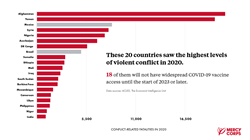
Of the 20 countries which saw the highest levels of conflict in 2020, 18 will not receive widespread vaccination until the start of 2023 or later.
“The longer conflict-affected countries wait for vaccines, the greater the risk that violence will increase.” – Tjada D’Oyen McKenna, Mercy Corps CEO
WASHINGTON (PRWEB)
March 25, 2021
At a National Press Club event, Mercy Corps Chief Executive Officer Tjada D’Oyen McKenna highlighted linkages between COVID-19 and conflict, warning that “the longer conflict-affected countries wait for vaccines, the greater the risk that violence will increase.”
Only two of the 20 countries that saw the highest levels of conflict worldwide in 2020 are projected to achieve widespread vaccination of their populations by mid-2022, with 18 unlikely to reach widespread vaccination until the start of 2023 or later. Mercy Corps teams have observed firsthand that COVID-19 is exacerbating conflict. Government responses to the pandemic, including lockdowns and border closures, are fraying community trust; misinformation is proliferating; and competition for resources has intensified. Armed groups are exploiting the pandemic, leading to an increased risk of deadly violence.
“What we’re hearing from communities tormented by violent conflict is even more worrying when you look at the timetable for access to COVID-19 vaccines. By the time vaccination efforts reach communities in fragile contexts, unequal distribution may itself deepen or sow new divisions. Vaccine refusal may be high and compliance with public health guidelines may be low, further prolonging the spread of the virus and fueling protracted waves of conflict and economic disruption. We urge the U.S. and other higher-income countries to take concrete action to ensure equitable vaccine distribution, provide sustained assistance to prevent millions from slipping deeper into poverty, and invest in conflict prevention,” says D’Oyen McKenna.
Preliminary findings from upcoming Mercy Corps research illustrate that:
- In Colombia, armed groups are exploiting the pandemic, coercing households to return to illicit crops like coca and ramping up youth recruitment.
- In South Sudan, lockdowns and movement restrictions are undermining traditional conflict resolution mechanisms such as communal meetings, leading communities to warn of serious tensions from unresolved disputes. The UN documented a 300% increase in local and regional violence from January-July of 2020 compared to the same period in 2019.
- In Northwest Nigeria, COVID-related closures of the border with Niger increased unemployment and reduced trade for border communities, significantly reducing trust among community members and strengthening armed banditry groups. These groups have exploited rising economic hardship and grievances to recruit new members. According to ACLED, abductions and forced disappearances, including of schoolchildren, increased by 169% in Nigeria from 2019 to 2020.
Read D’Oyen McKenna’s full remarks to the National Press Club here.
Share article on social media or email:

